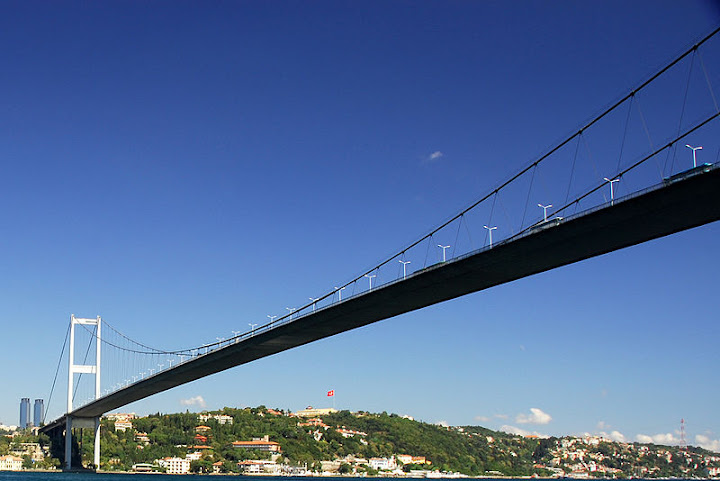Turkey: The Forgotten Ally In The Forgotten War – OpEd
Much has been said of the unique and ascendant role Turkey is playing in international relations. A member of NATO, a diplomatic power broker in the Middle East, and a rising international economic player, make Turkey a novelty even in an era of unprecedented global cooperation and political interdependence.
Less well-known is for how long Turkey has played this unique role, symbolized so succinctly by a bridge over the Bosporus River that links Asia to Europe, East to West.

For the United States, the bridge to Turkey spans more than two centuries. But it really took hold on the battlefields of the Korean War, where Turkish troops fought side by side with Americans. We mark the 59th anniversary of the War’s armistice on 27 July.
The Turkish intervention in Korea was unique in its timeliness and urgency. The 5,000-man Turkish brigade arrived in October 1950 as US forces, then acting as part of a United Nations coalition, were struggling to survive a powerful Chinese offensive. The following month, the brigade managed to halt an onslaught of six Chinese divisions around Kunu-ri. After the brigade helped stabilize the front, the Commander of the UN Forces, General Douglas MacArthur, said, “the Turks are the hero of heroes. There is no impossibility for the Turkish Brigade.”
As the war went on, Turkish soldiers continued to bravely aid the UN Coalition, earning recognition from General Walton H. Walker, Commander of the US 8th Army, and President Harry Truman, who awarded the Turkish brigade a Presidential Unit Citation. The prestigious award, given to units of the US Armed Forces and allied countries for extraordinary heroism against an armed enemy, recognized the Turkish brigade’s efforts to save the US 2ndDivision from total annihilation, losing 717 men in the process.
Turkey ultimately became the fourth largest military contributor to the UN effort, with a total of 15,000 Turkish troops serving in Korea at various times during the war. The camaraderie on the battlefield led to deep relations between American and Turkish soldiers. After they arrived in Korea, the Turkish troops were trained and equipped by the US Army, giving soldiers and officers several opportunities to strengthen their personal and professional ties.
The late Congressman John P. Murtha once noted how the Turkish intervention “gave hope to a demoralized American nation.” Marking the 50th anniversary of the Korean War in 2000, Murtha recalled how Turkish soldiers, after having run out of ammunition, affixed bayonets to their rifles and continued fighting in hand-to-hand combat.
Ankara’s brave decision to send troops to Korea in late 1950 also proved pivotal in securing Turkey’s entry into NATO the following year. When the alliance was formed in April 1949, Turkey was not invited to join. Washington was reluctant to commit to defend distant Turkey, and had also rejected Turkish proposals for a bilateral alliance or a unilateral US security guarantee. NATO’s West European members did not want to risk diluting the US economic and other assistance they were receiving.
Although some Turkish leaders wanted to pursue a more neutral foreign policy following NATO’s snub, Turkish policymakers continued to pursue NATO membership, believing the alliance offered Turkey the optimal Western anchor. Turkey’s key contribution to the Korean effort then made it impossible for the allies to turn down Ankara’s renewed membership campaign. In September 1951, Turkey along with Greece had received a formal invitation to join the alliance.
Turkey has since made major contributions to NATO. During the Cold War, Turkey helped constrain the Soviet Navy in the Mediterranean, provided one of the largest armies in Europe, and hosted key NATO military facilities. More recently, Turkish soldiers have contributed to NATO-backed missions in the former Yugoslavia and Libya.
The United States, Britain, and other members of the international community are now working closely with Turkey to bring peace to Afghanistan, the Middle East, and other global hotspots.
Today, more than one thousand Turkish soldiers serve in the International Security Assistance Force in Afghanistan. The Turkish military is training the Afghan National Security Forces, while Turkish diplomats have been pursuing regional peace initiatives such as the Istanbul Process, aimed at reconciling Pakistan and Afghanistan through confidence-building arrangements and other measures.
The camaraderie on the battlefields of Korea more than a half century ago set in motion an enduring alliance. Turkey and the United States are cooperating further in advancing democracy in the Middle East, reintegrating Iraq and Central Asia into the global economy, and reinforcing transatlantic bonds at a time when Washington’s attention increasingly focuses on Asia.

Yes, and Turkey has been really friendly to Israel, a US ally, especially lately.
But then polls consistently show that Turks are the most anti-American, anti-Semitic, and anti-Christian people in NATO.
Oh well, Mr. Weitz certainly tried hard.
Great article, Turks are always the best ally of US, even today they support every effort in ME to make sure US is succsesful bringing democracy in the region,but unfortunately some special intrest groups Lobbies passing resulotion after resulotion in US congress against Turkey,just few days ago they passed a resulotion aginst Indin tribes tohave close economic relationships ,due to Armenian and Greek Lobby objecting it, it is a shame that US foreign policy is hijacked by these groups